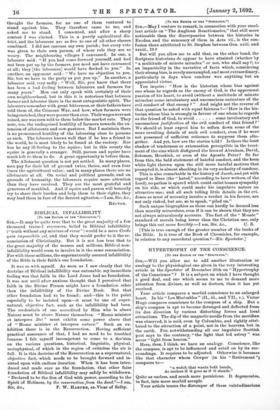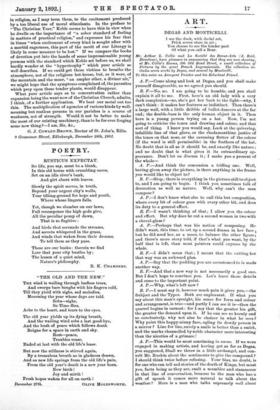HYPERTROPHY OF THE CONSCIENCE.
[To THE EDITOR OF THE " SPECTATOR." I you allow me to add another illustration or analogy to the physiological one given in the very interesting article in the Spectator of December 26th on " Hypertrophy of the Conscience " ? It is a subject on which I have thought a good deal, and one which seems to me to demand more- attention from divines, as well as doctors, than it has yet received.
Your article compares a morbid conscience to an enlarged heart. In his " Les Misembles " (II., iii., and VII., v.), Victor Hugo compares conscience to the compass of a ship. But a ship's compass is apt to become deranged and deflected from its due direction by various disturbing forces and local attractions. The dip of the magnetic'needle from the meridian. was observed, it is said, even by Columbus, and rightly attri- buted to the attraction of a point, not in the heavens, but in, the earth. For, notwithstanding all our impulsive Scottish poet says to the contrary, "the light that led astray" was_ never " light from heaven."
Here, then, I think, we have an -analogy. Conscience, like the compass, is apt to be influenced and acted on by its sur- roundings. It requires to be adjusted. Otherwise it becomes like that character whom Cowper (in his " Retirement ")r compares to—
"a watch that wants both hands,
As useless if it goes as if it stands."
Quite as useless, and much more pernicious. It degenerates,. in fact, into mere morbid scruple.
Your article traces the distemper of these valetudinarians in religion, as I may term them, to the excitement produced by a too liberal use of moral stimulants. In the preface to "The Christian Year," Keble seems to have this in view when he dwells on the importance of "a sober standard of feeling in matters of practical religion," and expresses his fear that in times "when excitement of every kind is sought after with a morbid eagerness, this part of the merit of our Liturgy is likely in some measure to be lost." If we compare the books of devotion put into the hands of some impressionable young persons with the standard which Keble set before us, we shall hardly wonder at the " hypertrophy " which your article so well describes. If we could get these victims to breathe the atmosphere, not of the religions hot-house, but, as it were, of the mountain and the moor, "an ampler ether, a diviner air," we might hope that the symptoms complained of, the parasites which prey upon these tender plants, would disappear. What your article says as to concentration rather than expansion being the want now of the Christian Church, admits, I think, of a further application. We beat our metal out too thin. The multiplication of agencies of various kinds by well- meaning but restless persons in our parishes is a source of weakness, not of strength. Would it not be better to make the most of our existing machinery, than to be for ever forging some new thing P—I am, Sir, &c., G. J. COWLEY-BROWN, Rector of St. John's, Edin.
9 Grosvenor Street, Edinburgh, December 28th, 1891.















































 Previous page
Previous page